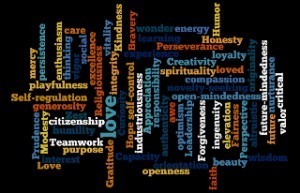
By Lisa Cypers Kamen.
When the going gets tough, everyone reverts to a different weapon of choice. And our arsenals are jam-packed with weapons that injure our foes: Sarcasm, pouting, snippy responses, the cold shoulder, anger, and denial, just to name a few. But when was the last time you thought about how you actually feel when you activate your defense mechanism of choice?
Life can be constant warfare. Prickly personalities rub us the wrong way in checkout lines, and drivers who cut us off or forget their turn signal irk us on the roads. At the office, coworkers with competitive streaks put our guards up. At home, a loved one’s bad day can fuel inconsiderate behavior that brings everyone down. Imagine what the world would look like if everyone responded to conflict by pulling out a weapon like anger, sarcasm or haughtiness. Pretty grim picture, right? Living in perpetual conflict is like living in a ticking time bomb.

Now, imagine a world where people bring a different kind of weapon to the table: Character strengths. Positive psychology gurus have developed a running list of 24 virtues that, when engaged, put a positive spin on a situation and our lives.
Here’s a taste of the traits on the list: Creativity, open-mindedness, honesty, zest, capacity to love and be loved, teamwork, modesty, gratitude and hope. If we each filled our arsenal with positive virtues like these, we would enter a potential conflict with the goal of resolving it in a way respectful to the other party involved. Sticking to our virtues is a simple way to overcome adversity and foster our positive traits.
The more we engage these positive virtues, the stronger they will become, and the happier everyone will be. Happiness comes from utilizing our values, not our armaments. Once you fill your arsenal with things like honesty, open-mindedness and modesty, you’ll be shocked at how well you can diffuse conflicts without the need for weapons of mass emotional destruction.
Happiness is an inside job®.
Happiness Strategy:
Imagine a hypothetical conflict between you and a friend. The situation arose after you unintentionally missed a lunch date you had scheduled with that friend. As you and your friend discuss the situation, you can hear his or her tone of voice sharpen. On a piece of paper, write down the first response that comes to mind. Think about what weapon you thought to engage: Who will it harm and who will it help?
Now think about what would happen if you engaged the positive virtue of being able to relate to another person’s perspective. Operating with this weapon, what would the rest of the dialogue between you and your friend look like? The next time a conflict arises, rely solely on your arsenal of virtues to resolve the situation.

This Post Has 0 Comments